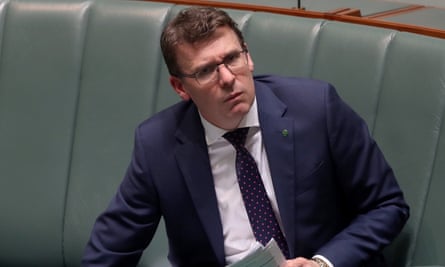Extract from The Guardian
Deal will effectively limit scrutiny of unlawful and damaging compliance checks.
Last modified on Tue 17 Nov 2020 11.51 AEDT
In March 2017 Alan Tudge, then the human services minister, was under pressure over a different scandal.
Fresh from releasing the personal information of a debt recipient who had written an article critical of the robodebt scheme, and threatening so-called welfare cheats with jail, Tudge told the ABC’s Fran Kelly that critics who believed the program was flawed had a “philosophical objection to widespread compliance checks”.
Despite the bluster, what few aside from those inside Tudge’s department knew was that the government was already receiving warnings about the legality of the Coalition’s chief welfare crackdown measure.
And they went beyond the initial complaints of community campaigners, welfare groups and early critics in the parliament, including the independent MP Andrew Wilkie, the Greens’ Rachel Siewert and Labor’s Murray Watt.
On Monday, on the first day of a class action trial into the robodebt scandal, the saga finally came to its apparent conclusion, as the commonwealth agreed to a $1.2bn settlement with 400,000 victims of the scheme – perhaps one of the biggest and most expensive policy fiascos of a generation.
The deal negotiated by the law firm Gordon Legal includes $112m in additional compensation on top of previous commonwealth announcements.
Centrelink’s income compliance program, which ran from 2015 to November 2019, forced some victims to pay unlawful welfare debts in the tens of thousands of dollars. Some were pursued relentlessly by privately contracted debt collectors, were homeless, suffering poor mental health or had serious disabilities.
There have been reports of suicides linked to the scheme, strenuously denied by the government.
The settlement also speaks to the way the government has handled this saga from day one.
It spares the government two weeks of potentially embarrassing documentary evidence about, as Labor’s Bill Shorten put it, “who knew what when”.
Tudge, for example, was named in Gordon Legal’s submissions as either knowing the scheme was unlawful or being “recklessly indifferent to it”. (Those claims were strenuously denied by the commonwealth in pre-trial hearings and the government accepted no liability or knowledge in the agreed settlement.)
When Tudge gave his interview to Kelly in March 2017, the government is said to have already lost four robodebt decisions at the first tier of the administrative appeals tribunal.
Though the claim will now not be tested by the court, Gordon Legal alleged there were at least another 72 tribunal decisions that “set aside” robodebts.
The overwhelming majority took place in 2017, when Tudge was the minister.
These decisions were never made public, and despite the commonwealth’s obligations as a model litigant, not once did the government appeal a case to the tribunal’s second tier to clarify the law. The second tier publishes its judgments.
Despite the legal doubts, the scheme rolled on. Centrelink continued regularly garnisheeing people’s tax returns, including a homeless woman who spoke to Guardian Australia. The estates of more than 3,000 people are among those now being refunded the unlawful debts.
Terry Carney, who wrote at least five of the AAT decisions, abruptly lost his position at the tribunal in 2017 after four decades. Guardian Australia revealed in 2018 that Carney’s view that the scheme was unlawful.
Stuart Robert became the government services minister in May 2019, a few months after Victoria Legal Aid finally launched a federal court test case against the scheme.
Early in the proceedings, the debt owed by the applicant in the case was wiped. The government then told the court that there was no longer a case to answer. Undeterred, Legal Aid recruited a second applicant.
In November Robert abruptly announced what he called a “refinement” to the scheme, scrapping the averaging of annual Australian Taxation Office pay data to issue debts. Robert claimed only a “small cohort” of people had been issued a debt based solely on income averaging.
A week later, the government settled its case with Victoria Legal Aid.
The “small cohort” described by Robert was in fact 300,000 debts unlawfully recouped by the government.
In purely financial terms, the “refinement” has cost $721m in refunds, $400m in debts the government has been forced to wipe, $112m in compensation and at least $600m in costs administering the scheme. All for a program that was supposed to save taxpayers more than $3bn.
The human cost is yet to be fully accounted for.
Gordon Legal’s settlement will not please everyone. Split between 400,000 people, the $112m equates to only modest compensation for many and is roughly equivalent to the interest they are owed. Legal costs are yet to be determined.
Others who responded to Centrelink’s demands by providing payslips or bank information won’t get a refund either. Gordon Legal initially argued that those debts were “tainted” due to a reversal of the onus of proof.
The government was actually confident of defeating Gordon Legal’s claims of negligence in court, confidential advice seen by the Guardian showed.
But it also believed a strategy to proactively announce refunds, before seeking to settle the case, would “temper criticism of the government’s actions”, allow the government to have “more control” over the process, “reduce the incentive for the Applicants to persist with the class action, and minimise the Commonwealth’s potential liability for interest and legal costs”.
What was left unsaid – even in the private advice – is that a settlement also means the government will continue to avoid the scrutiny Labor, the Greens and welfare campaigners hope might now come from a royal commission.
No comments:
Post a Comment